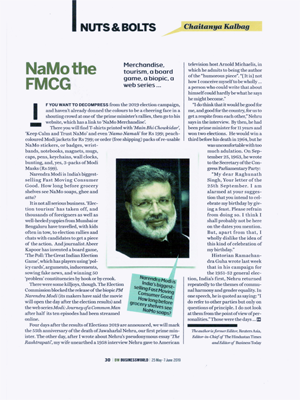NaMo the FMCG
[Business World]
Published date: 25 May 2019
If you want to decompress from the 2019 election campaign, and haven’t already donned the colours to be a cheering face in a shouting crowd at one of the prime minister’s rallies, then go to his website, which has a link to ‘NaMo Merchandise’.
There you will find T-shirts printed with ‘Main Bhi Chowkidar’, ‘Keep Calm and Trust NaMo’ and even ‘Namo Namah’ for Rs 199; peach coloured Modi jackets for Rs 799; or order (free shipping) packs of reusable NaMo stickers, or badges, wrist-bands, notebooks, magnets, mugs, caps, pens, keychains, wall clocks, bunting, and, yes, 3-packs of Modi Masks Narendra Modi is India’s biggest selling Fast Moving Consumer Good. How long before grocery shelves see NaMo soaps, ghee and atta?
It is not all serious business. ‘Election tourism’ has taken off, and thousands of foreigners as well as well-heeled yuppies from Mumbai or Bengaluru have travelled, with kids often in tow, to election rallies and chats with candidates to get a piece of the action. And journalist Abeer Kapoor has invented a board game, ‘The Poll: The Great Indian Election Game’, which has players using ‘policy cards’, arguments, inducements, sowing fake news, and winning 50 ‘problem’ constituencies by hook or by crook.
There were some killjoys, though. The Election Commission blocked the release of the biopic PM Narendra Modi (its makers have said the movie will open the day after the election results) and the web series Modi: Journey of a Common Man after half its ten episodes had been streamed online.
Four days after the results of Elections 2019 are announced, we will mark the 55th anniversary of the death of Jawaharlal Nehru, our first prime minister. The other day, after I wrote about Nehru’s pseudonymous essay’ The Rashtrapati’, my wife unearthed a 1958 interview Nehru gave to American television host Arnold Michaelis, in which he admits to being the author of the “humorous piece”. “[It is]not how I conceive myself to be wholly … a person who could write that about himself could hardly be what he says he might become. I do think that it would be good for me, and good for the country, for us to get a respite from each other,” Nehru says in the interview. By then, he had been prime minister for 11 years and won two elections. He would win a third before his death in1964, but he was uncomfortable with too much adulation. On September 25, 1963, he wrote to the Secretary of the Congress Parliamentary Party: “My dear Raghunath Singh, Your letter of the 25th September. I am alarmed at your suggestion that you intend to celebrate my birthday by giving a feast. Please refrain from doing so. I think I shall probably not be here on the dates you mention. But, apart from that, I wholly dislike the idea of this kind of celebration of my birthday.”
Historian Ramachandra Guha wrote last week that in his campaign for the 1951-52 general election, India’s first, Nehru returned repeatedly to the themes of communal harmony and gender equality. In one speech, he is quoted as saying: “I do refer to other parties but only on questions of principle. I do not look at them from the point of view of personalities. “Those were the days.






